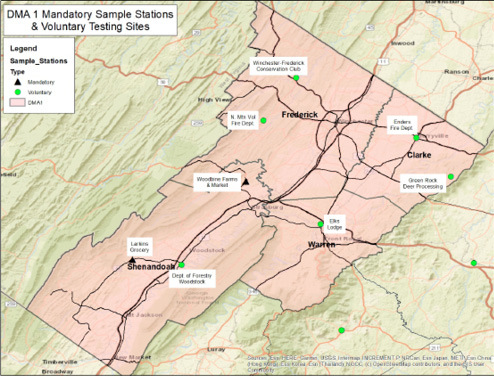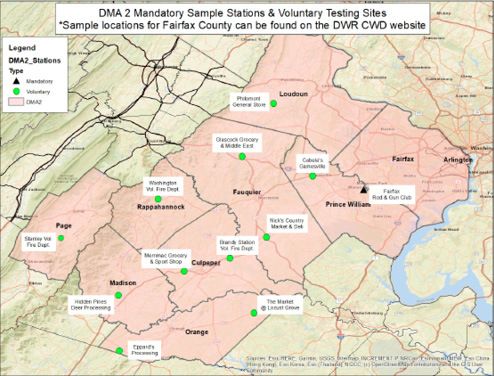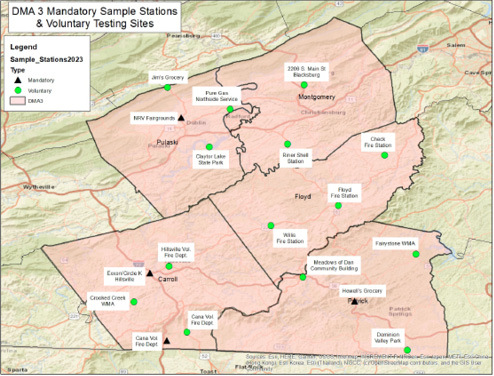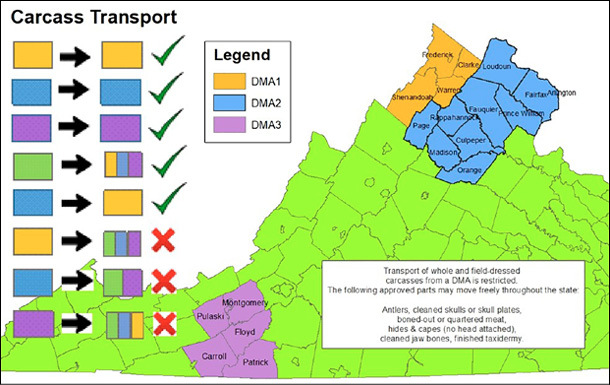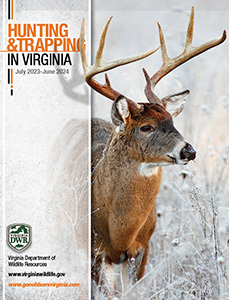Deer Hunting CWD
Chronic Wasting Disease
Chronic wasting disease (CWD) is an infectious, fatal, neurologic disease of deer. Since 2009, a total of 179 CWD-positive deer have been confirmed in Virginia. While the vast majority of these detections have occurred in Frederick and northern Shenandoah counties, CWD has also been confirmed in Clarke, Culpeper, Fairfax, Fauquier, Floyd, Loudoun, Madison, Montgomery, Pulaski, Rappahannock, and Warren counties. DWR cannot manage CWD alone and we need your help to slow the spread of this disease. Visit www.dwr.virginia.gov/wildlife/diseases/cwd/ for details on what DWR is doing to fight CWD. Please read the following text carefully to learn what you can do to help.
2023 Disease Management Areas
All counties located within 10 miles of a CWD detection are included in a Disease Management Area (DMA).
- DMA1: Clarke, Frederick, Shenandoah, and Warren counties.
- DMA2: Arlington, Culpeper, Fairfax, Fauquier, Loudoun, Madison, Orange, Page, Prince William, and Rappahannock counties.
- DMA3: Carroll, Floyd, Montgomery, Patrick, and Pulaski counties.
CWD Surveillance
When you hunt in a CWD DMA, one of the most important things you can do to help fight this fatal disease is to submit your deer for CWD testing. CWD can be slow to spread in an affected deer population, therefore several years of testing data is critical to allow DWR to assess the status of the disease in the population. Testing helps DWR do several important things, like monitor the infection rate of the local deer population and map the geographic spread. This information is critical to helping DWR slow the spread of this disease. Hunters are a vital partner in DWR’s CWD surveillance efforts and their assistance is appreciated.
Mandatory DMA CWD Testing
DWR will be conducting mandatory CWD sampling on November 18 in DMA1 (Shenandoah only), DMA2 (Prince William only), and DMA3 (Carroll, Patrick, and Pulaski). All deer killed in these counties on November 18 must be brought to a CWD sample station OR a voluntary drop station for CWD testing. Sample stations are open from 8:00 a.m. to 7:00 p.m. Sample stations can also be found on the maps below.
- DMA1 sample stations (Shenandoah County only): Larkin’s Store and Woodbine Farm and Markets.
- DMA2 sample station (Prince William County only): Fairfax Rod & Gun Club.
- DMA3 sample stations (Carroll, Patrick, Pulaski counties): Exxon/Circle K (US-221N/Rt. 743) and Cana Vol Fire Dept (I-77/Rt. 691) in Carroll County; Howell’s Grocery in Patrick County; and New River Valley Fairgrounds in Pulaski County.
There will be no mandatory CWD testing in Arlington, Clarke, Culpeper, Fairfax, Fauquier, Floyd, Frederick, Loudoun, Madison, Montgomery, Orange, Page, Rappahannock, or Warren counties in 2023.
Voluntary DMA CWD Testing
Voluntary CWD testing is available free of charge for any deer harvested in a DMA at any time during the deer season. Interested hunters should drop off the deer head, plus 4 inches of neck, at a DWR refrigerator and follow posted instructions. Please see our website at http://www.dwr.virginia.gov/cwd for a map of the most up-to-date voluntary drop stations.
Voluntary Statewide CWD Testing
New this year, DWR will be offering free CWD testing statewide through use of refrigerator stations at selected DWR offices. Please see our website at http://www.dwr.virginia.gov/cwd to see locations of these stations.
CWD Management
DMA1
- All counties in DMA1 are open for early (Sept. 2 - Oct. 6) and late (Jan. 7 - March 31) antlerless-only general firearms season on private lands.
- Earn a Buck is in effect for all counties within DMA1.
DMA2
- All counties in DMA2 are open for early (Sept. 2 - Oct. 6) and late (Jan. 7 - March 31) antlerless-only general firearms season on private lands.
- Earn a Buck is in effect for all counties within DMA2.
DMA3
- Early (Sept. 2 - Oct. 6) and late (Jan. 7 - March 31) antlerless-only general firearms season on private lands in Carroll, Floyd, Montgomery, and Pulaski counties.
- Earn a Buck is in effect for Carroll, Floyd, Montgomery, and Pulaski counties.
Please note: Patrick County is not included in the early or late antlerless-only general firearms season.
- Disease Focus Zone (DFZ): Landowners located within the Disease Focus Zone bordered to the north by I-81, to the east by Riner Rd (Rt 8), and to the south and west by the Little River, with contiguous property totaling 5 acres or more are eligible for additional either-sex CWD Management Tags. Please check dwr.virginia.gov/wildlife/diseases/cwd/dma-3/ for additional details.
Deer Carcass Transport
The movement of whole deer carcasses and certain carcass parts can spread CWD to new areas. As such, DWR has restricted deer carcass part movements from higher-risk areas to lower-risk areas.
Restricted Transport of Deer Carcasses and Parts Originating from a DMA
Whole deer carcasses originating from within a DMA cannot be transported into a non-DMA county. Carcass parts allowed to be transported out of a DMA into a non-DMA county include:
- Boned-out meat.
- Quarters or other portions of meat with no part of the spinal column or head attached.
- Hides and capes with no heads attached.
- Clean (no meat or tissue attached) skulls and skull plates with or without antlers attached.
- Antlers with no meat or tissue attached.
- Upper canine teeth, also known as “buglers,” “whistlers,” or “ivories.”
- Cleaned jaw bones.
- Finished taxidermy products.
Restricted Transport of Deer Carcasses and Parts Between and Within DMAs
- Deer originating from DMA1: Whole deer carcasses, and parts not listed above, may be transported anywhere within DMA1 only.
- Deer originating from DMA2: Whole deer carcasses, and parts not listed above, may be transported anywhere within both DMA1 and DMA2.
- Deer originating from DMA3: Whole deer carcasses, and parts not listed above, may be transported anywhere within DMA3 only.
Restricted Out-of-State Deer Carcass Importation
Importation or possession of whole deer carcasses originating from anywhere outside of Virginia is prohibited. This includes all members of the deer family, including white-tailed deer, mule deer, elk, moose, etc. See list above for deer carcass parts originating from anywhere that can be legally imported and possessed in Virginia.
A legible label shall be affixed to packages or containers holding the allowed carcass parts with the following information: the species of animal, the state or province from where the animal originated, and the name and address of the person who killed or possesses the allowed parts of the animal in Virginia. Any person who imports into Virginia any deer parts described above and is notified that the animal has tested positive for CWD must report the test results to the Department (see website for details) within 72 hours of receiving the notification.
Transport of Deer Carcasses from a Non-DMA County
Whole deer carcasses (and all associated carcass parts) harvested in a non-DMA county in Virginia may be legally transported anywhere within Virginia. However, due to potential disease transmission risks, it is advisable to avoid transporting whole carcasses long distances, if possible.
Carcass Disposal Recommendations
All hunters are strongly encouraged to dispose of deer carcass remains in local dumpsters, lined landfills, or using regular trash pick-up that will be taken to a landfill. See the agency website listed below for disposal options for deer harvested in a DMA. If it is necessary to bury a carcass, hunters are advised to bury it as close to the kill site as possible and deep enough to prevent scavengers from digging it up.
Deer Feeding and Use of Attractants
Deer Feeding Prohibitions
Feeding of deer is prohibited year-round in Albemarle, Arlington, Augusta, Bland, Buchanan, Carroll, Clarke, Craig, Culpeper, Dickenson, Fairfax, Fauquier, Floyd, Fluvanna, Franklin, Frederick, Giles, Grayson, Greene, Loudoun, Louisa, Madison, Montgomery, Orange, Page, Patrick, Prince William, Pulaski, Rappahannock, Roanoke, Rockingham, Shenandoah, Spotsylvania, Stafford, Warren, Wise, and Wythe counties, and all cities and towns within these counties.
Natural Deer Urine Attractants Illegal in Virginia
It is illegal to possess or use deer scents or lures that contain natural deer urine or other bodily fluids while taking, attempting to take, attracting, or scouting wildlife in Virginia.
What You Can Do to Help Fight CWD
- Keep hunting!
- Don’t feed deer and remove mineral licks
- Get deer harvested in a DMA tested for CWD
- Avoid long-distance movements of a whole deer carcass
- Don’t discard leftover deer carcass parts on the landscape – dispose in a landfill or bury
- Stay informed about CWD
For more information on CWD in Virginia, go to:
www.dwr.virginia.gov/wildlife/diseases/cwd
